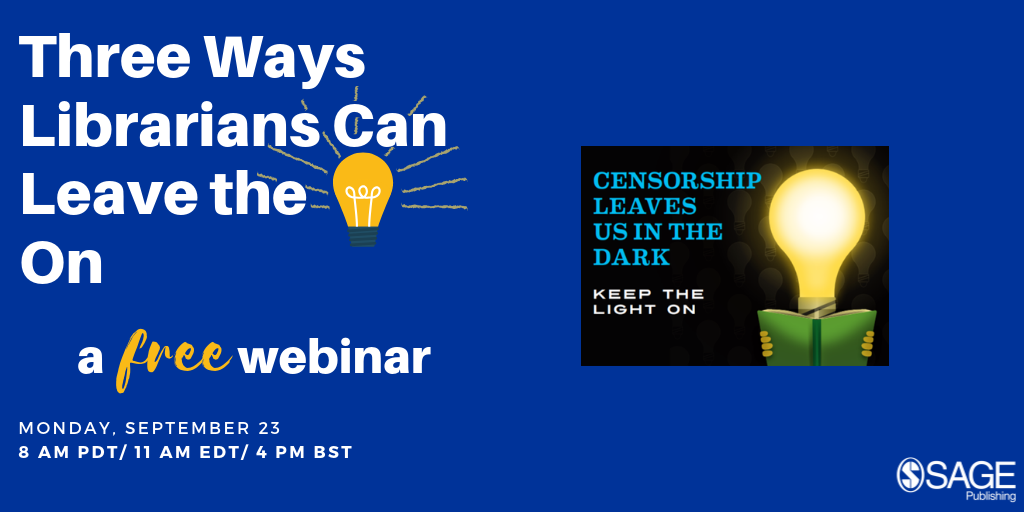[vc_row][vc_column][vc_video link=”https://youtu.be/KSxDIAuOCdI”][vc_column_text]Libraries are often the first place children experience the joy of reading. But what happens when a community attempts to censor the collection so that it reflects just one worldview?
Courtney Kincaid, assistant library director at North Richland Hills Library, told her harrowing story of being at the frontline of a battle over books at her library in Texas, in which she was followed from her work and did not eat out for fear people would spit in her food.
All of this because the library stocked two children’s books.
Kincaid was speaking as part of the event Three Ways Librarians Can Combat Censorship, which was organised by Sage Publishing as part of Banned Books Week. Kincaid was joined by two other panellists, Molly Dettmann, a school librarian at Norman North High School in Oklahoma, and Adriene Lim, dean of libraries at the University of Maryland. It was chaired by deputy editor of Index on Censorship magazine Jemimah Steinfeld.
Kincaid said how in 2015 she was director of Hood County Library in Granbury, Texas, which she described as a ‘tea-party town’. When two children’s books, My Princess Boy by Cheryl Kilodavis and This Day in June by Gayle E. Pitman, were added to the shelves, a 21 week ordeal began for Kincaid as she defended the books against determined protestors.
Both books featured themes of diversity and acceptance of sexual difference, but were accused of promoting an LGBT lifestyle and perversion. Kincaid was faced with increasingly aggressive demands to remove the books. Some people wanted them burned. Kincaid said how she became a pariah in her town. She feared eating in restaurants in case people spat in her food. A state senator contacted her to admonish her for her fight to keep the books in the library. Kincaid attempted to reach a compromise by moving the books to the adult non-fiction section, but found this did not satisfy the protestors. She said: “They cared about their agenda and their agenda only, and it was anti-LGBT.” On 13 October 2015 the library won a legal battle for the books to remain.
Kincaid had since moved out of Granbury, Texas and was awarded for her efforts to protect the collection in Hood County Library with an I Love My Librarian award in 2015. She told the panel that the lesson she learned from her experience is to never try to find a middle ground with those attempting to censor. Her advice to librarians feeling pressure to self-censor: “Don’t be scared of what would happen. If you think your community needs a book, buy it. Stand your ground.”
Dettman, who herself is familiar with battles over which books should be on library shelves, highlighted her concerns over self-censorship which she said is widespread amongst librarians. She emphasised her belief that a school library should be a safe and welcoming place for all children and encouraged teachers to stock the library with an inclusive range of books. “Your kids deserve that so much. They need it, you have to remember that,” said Dettman.
She said books can transform lives, with it therefore being crucial to therefore have a library stocked with a very broad mix of books.
Lim spoke of when a mural was vandalised at the library in the University of Oregon when she was dean of libraries there. The mural depicted what Lim described as a white male supremacist narrative about the building of civilisation. Whilst not personally agreeing with the sentiment of the mural, Lim saw it as historical artefact and integral to the library’s original architectural design. She said that open and honest sharing of perspectives is a good thing because when voices are oppressed, when dialogues are shut down, “it is those with less power who will suffer the most.”
“If people pick and choose which historical perspectives can be displayed according to current values, where does that leave libraries?” Steinfeld added.
While the webinar was held as part of Banned Books Week, Dettman urged everyone to celebrate books and continue to fight against censorship in libraries throughout the year. “Don’t wait for Banned Books Week. Do it all the time,” she said. [/vc_column_text][vc_basic_grid post_type=”post” max_items=”4″ element_width=”6″ grid_id=”vc_gid:1569574933173-1fc994b1-338d-3″][/vc_column][/vc_row]





